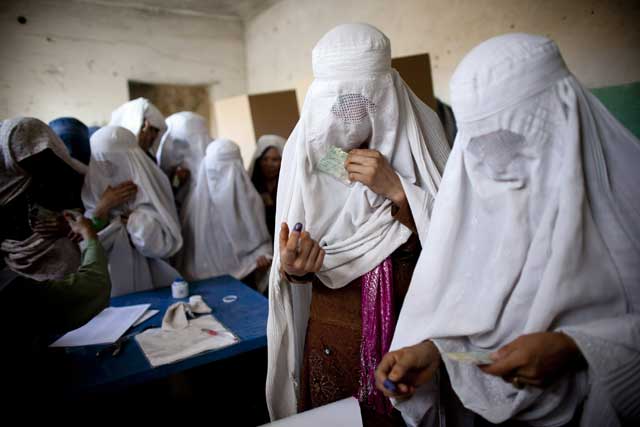Eight die as the Taliban disrupt Afghan elections
Some voters too scared to cast ballots, but officials claim 92 per cent of polling stations remain open

Afghans braved Taliban rockets and polling site bombings yesterday to vote for a new parliament in elections seen as a measure of the government's competence and commitment to democratic rule. It was the first nationwide balloting since a fraud-marred presidential election last year undermined international support for President Hamid Karzai. Security has worsened since then, and the Taliban made good on threats to disrupt yesterday's polling.
At least three civilians and five militiamen were killed, and the governor of Kandahar province survived a bomb attack. Observers had expected the vote to be far from perfect, but hoped it would accepted by the Afghan people as legitimate.
About 2,500 candidates were vying for 249 seats in the parliament.
The militants struck with rockets throughout the country – the first one slamming into the capital before dawn, followed by strikes in major eastern and southern cities. A rocket in northern Baghlan province killed two civilians, and another civilian was killed in an insurgent strike on a house in eastern Kunar province. The insurgents also launched scattered attacks on polling stations, and clashed with security forces, who killed at least five militants.
Afghan security officials dismissed the attacks as "insignificant", and said they did not hamper voting, adding that 92 per cent of polling stations were open. "There are no reports of major incidents," the Afghan Election Commission chairman Fazel Ahmad Manawi told reporters. However, there were some reports of voting irregularities and turnout nationwide appeared spotty at best, though the level of violence seemed lower than during last year's presidential poll, when more than 30 civilians and more than a dozen Afghan security forces were killed.
Polls officially closed at 4pm, but in areas of the capital with a heavy turnout some shut earlier because of a shortage of ballots, while some others allowed voting past the deadline.
Electoral officials said they had no separate process for determining turnout ahead of the counting of the ballots. The first partial tallies are expected in a few days. Full preliminary results are not expected until the end of the month and final results in late October.
In the Taliban stronghold of Kandahar in the south, voters ventured out in small groups despite rocket strikes and bomb blasts. Voters even lined up in the Zhari district, west of Kandahar city, where Taliban leader Mullah Omar's radical Islamic movement was born 16 years ago. Hundreds of Afghan and international troops secured the area. "People are fed up with the Taliban, that's why they're coming out more and more, so they can get rid of the Taliban," businessman Saleh Naeem said.
The Taliban had warned they would target anyone voting or working at the polls. In the north, insurgents on motorbikes attacked a polling centre in Sar-e-Pul province, scaring off 10 Afghan police trainees, breaking windows and ballot boxes, and making off with some election materials. In northern Kunduz province, militants tried to disrupt security in Gortepa. In eastern Ghazni province, a series of rockets scared many voters into staying at home.
Questions about fraud-prevention measures arose within hours of the polls opening yesterday. Campaign worker Mohammad Hawaid in Kabul complained that the ink applied to voters' fingers to prevent them from casting multiple ballots was not working. The ink is supposed to last 72 hours. "It can be wiped off," Mr Hawaid said. "This is a major irregularity."
In Jalalabad, observers said poll workers were letting people vote with faked registration cards. "The women coming here have so many cards that don't have the stamp and are not real cards but still they are voting," said Nazreen, a monitor for the Free and Fair Election Foundation of Afghanistan, which has dispatched observers throughout the country. Fake voter cards flooded into Afghanistan ahead of the balloting, but election officials had promised that poll workers were trained to spot them. Nato's senior civilian representative said some fraud was expected, and that it would not necessarily undermine the vote. Mark Sedwill said: "The real issue is the scale of that and does it affect the result. And does it affect the credibility of the election, not in our eyes but in the eyes of the Afghan people?"
Join our commenting forum
Join thought-provoking conversations, follow other Independent readers and see their replies
Comments
Bookmark popover
Removed from bookmarks